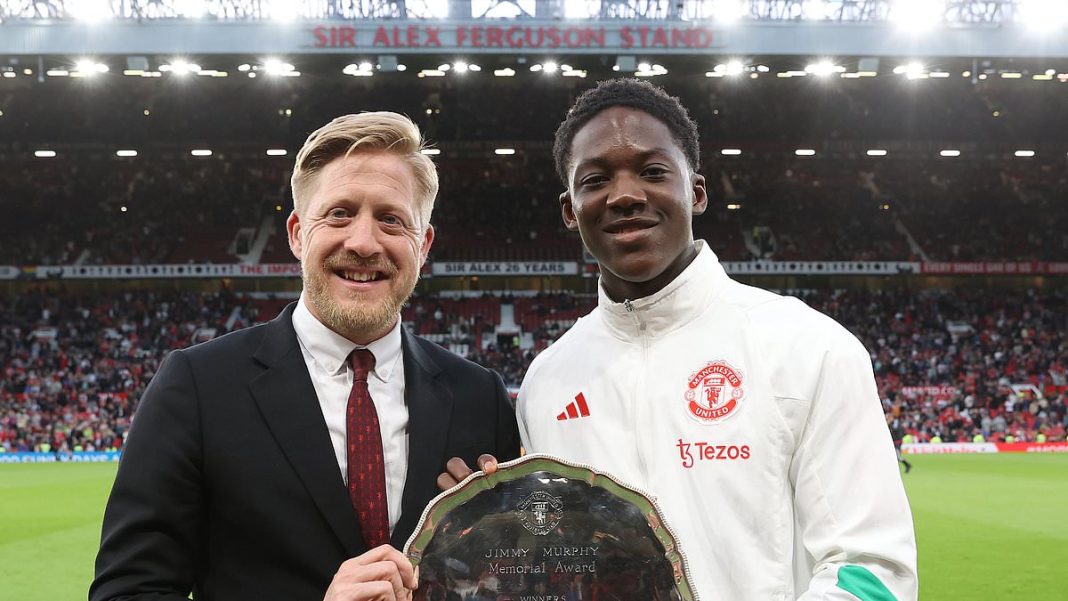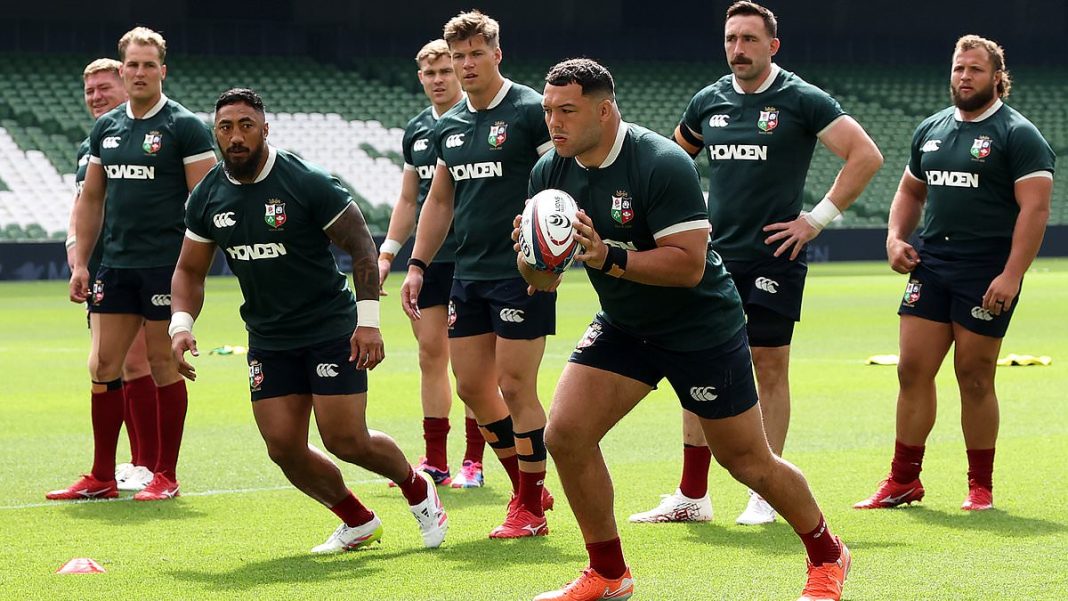- This is how Cox revolutionised the way trainees are treated, the astonishing list of talents he brought in… and how his kids almost cost United a star
- Subscribe to Mail+ to read more exclusive scoops and in-depth coverage and analysis from Old Trafford
As late as this week, Nick Cox was confining talk of his exit to a small circle.
After nine years at Manchester United, Cox is heading for a new challenge at Everton where the prospect of becoming technical director and being given the scope to map out a brighter future for the Toffees was too good to turn down.
There had been similar offers to leave before, from English clubs and from some on the continent, but the feeling was different after he was headhunted by Everton.
Figures at Everton were unimpressed that news of Cox’s arrival, which is yet to be inked officially but is understood to be a formality, had leaked out. They thought they had pulled off the executive signing of the summer in secret.
Some of Cox’s closest confidants at United began to find out late last week that he was bound for Merseyside but some player relatives and agents who spoke to Cox only this week about next steps for players had no inkling, just as he would have wanted.
It leaves a giant hole in United’s academy set-up, which was already reeling from the losses of Under 18 head coach Adam Lawrence and Under 21 assistant Dave Hughes. Cox, though, will be the biggest loss of all.
‘He’s very fair and actually cares,’ one agent said of the 47-year-old.
‘He’s very hands on,’ another said. ‘He is highly respected and is an ambitious guy. The time is right for him to move into a more senior role and I’m sure he will show well.’
Cox has come a long way since his days as a sports science lecturer at Oaklands College in 2000.
His route to becoming one of the most influential figures in academy football in this country has included stop-offs at Watford, where he started as development centre coordinator in 2001, then rose to academy manager in 2009.
He had four years in the same role at Sheffield United and across those two clubs he counted Jadon Sancho (Watford) and Aaron Ramsdale, David Brooks and Dominic Calvert-Lewin (Sheffield United) among the talents he was nurturing.
When he walked through the door at United in 2016 as academy operations manager, honing talent was naturally a key focus. But Cox is as much about education as anything else.
Ask him for his proudest moments and they may include first-team debuts for players such as Kobbie Mainoo, the FA Youth Cup win in front of more than 60,000 at Old Trafford in 2022, or even the Under 18 domestic treble the season before last.
It may even be that 16 academy graduates made their debuts under Ole Gunnar Solskjaer in three years, a phenomenal record of progression.
Ask him for his most stressful moment and he may point to how he nearly messed up the signing of Alejandro Garnacho on Zoom during Covid.
While Cox was trying to persuade one of Argentina’s best young talents to commit his future to United, his two sons began an argument in the background of his spare bedroom. ‘I still tell my boys now, had that argument rumbled on much longer then we probably wouldn’t have Alejandro Garnacho at Manchester United,’ he said.
Cox’s methods spread beyond the technical and physical. Last year he arranged for Tom Heaton to speak to all academy goalkeepers from ages nine to 16 about the power of journalling, and the impact it had on a career that has run for 380 senior appearances and three England caps. Heaton is signing a new deal to stay at United, where he came through the academy before making his name at Burnley.
Each youngster in the room left armed with their own United-designed journal and, professional career or not, the impact of that session may go on to be of critical importance. That is Cox all over.
‘It was important to him that all across the club understood our duty to guide players through their journey, however that may pan out, in the most enjoyable and educationally valuable way possible,’ one staff member said of Cox this week.
A year prior in 2023 he launched an alumni programme to place greater emphasis on aftercare for those players who had left the club. It helps around 225 players who have exited United’s youth system since 2012, steering them through the tricky years after an aspiring player’s career dream ends.
He follows carefully the careers of those who came through United’s academy, with his Twitter feed a rolling tribute to that production line.
His recent posts include a congratulations to Scott McTominay for winning Serie A with Napoli and Dean Henderson for his FA Cup triumph with Crystal Palace, glowing praise for an interview given by former midfielder Angel Gomes and an emotional testimony after the passing of Joe Thompson.
Those careers and lives were of immense importance to Cox, even when their on-pitch contributions no longer came in a United shirt.
Creating more rounded people is at the heart of Cox’s ethos. Cooking classes became commonplace for players across the age groups, as did life skills workshops on mental health, safe driving, and equality.
‘Nick has worked hard not only to produce good players but good people with a well rounded football experience and education,’ Martin Devaney, father of Under 18 captain Jacob, told Mail Sport. ‘He’s been at the forefront of innovative coaching and education and players get so many experiences on and off the pitch.
‘He’s been brilliant for the development of players and always tried to uphold and instil the Man United philosophy and history. From my experience he has always got the coaches and players ready for the next step on their journey.’
There were global tours – Spain, Hong Kong, the USA, and the Netherlands – for cultural exposure, while the Under 13s have learned extensively about the Munich Air Disaster and even gave presentations to peers on the darkest moment in the club’s history.
Many parents point to Cox’s decision not to release a single player during the Covid pandemic. That moment, in Cox’s eyes, was not the moment to drop those who would eventually need to seek pastures new.
On the pitch, where the pressure to deliver is more pertinent than ever in the era of tighter profit and sustainability rules (PSR) and financial fair play (FFP) to satisfy, Cox has delivered in spades, too, generating around £100m in academy sales.
In 2023-24, academy graduates received more first-team playing time at Manchester United than any other Premier League club – 11,835 minutes, 40 per cent more than Chelsea, who ranked 2nd.
Last season United ranked second, with debuts for Harry Amass, Tyler Fredricson, Chido Obi and Ayden Heaven, all nurtured or recruited under Cox and his staff.
Recruitment is viewed as one of the greatest signs of success in Cox’s tenure as United have established themselves as one of the dominant forces right through the age ranges.
While Chelsea and Manchester City remain heavy hitters in this area, United under Cox coaxed Garnacho out of Atletico Madrid, Toby Collyer from Brighton, Amass from Watford, and Obi and Heaven from Arsenal. All have featured in the first team.
Others such as Amir Ibragimov, who was at Sheffield United, Ethan Ennis, who came from Liverpool, Gabriele Biancheri (Cardiff City) and JJ Gabriel are pieces of really clever recruitment on Cox’s watch that could pay dividends for the first team or for PSR reasons.
It was telling to those in academy circles that, for the most part, Ineos allowed the academy to run without many of their fingerprints on it after they assumed control of the football side of the club.
After all, Cox had successfully transformed it in all areas – operations, recruitment, performance and education – since becoming director of academy.
While sporting director Wilcox was a regular attendee at Under 18 and Under 21 games, his input was limited.
That has since changed and the feeling in recent months among parents has been that staff right through the academy, not just Cox, have seen power of decision diluted as the ownership become increasingly hands on.
But Cox’s own honours board is large and worthy of mention as he prepares to close the book on this latest chapter.
He made a big push for high percentage sell-on clauses for academy players – that could come in very handy again this summer with Anthony Elanga and Alvaro Carreras potentially switching clubs – while his staff development has been second to none.
Cox has hired, worked with and developed coaches such as Kieran McKenna (Ipswich Town boss), Justin Cochrane (Tottenham Hotspur assistant and England first team coach), Tom Huddlestone (Birmingham City assistant), Paul McShane (Huddersfield Town assistant), Martin Drury (Valencia assistant) and Hughes, who took over as Newport County manager this summer.
He frequently looked to push young talented players to higher age groups – 14-year-old Gabriel playing with the Under 18s last season and 16-year-old Louie Bradbury making his Under 21 debut.
Cox, who recently completed his UEFA Pro Licence course alongside former England internationals Jack Wilshere and Darius Vassell, also introduced a player-coach role into the Under 21s: McShane, Huddlestone and Tommy Rowe the three hired for such a specialist position.
He has integrated former players including Phil Jones into the Under 18 coaching set-up – although it’s understood Jones, while keen, won’t be landing the job to replace Lawrence as manager.
Jonny Evans has been doing his coaching badges behind the scenes, too, with a nod to a future on the touchline.
Cox was bold in his beliefs, partly overseeing the decision not to mirror Ruben Amorim’s 3-4-2-1 system across age groups after the Portuguese’s arrival.
A meeting between Cox, Wilcox, Amorim and Darren Fletcher, a key ally of Cox and a conduit between the academy and first team, determined that there was to be a greater emphasis put on player development, rather than focusing on getting a couple of players into the first team in a very specific system.
The onus will now fall on Wilcox to land a replacement who can maintain and build on the building blocks Cox spent years putting in place. Former Chelsea chief Jim Fraser is understood to be among the frontrunners.
Cox has a 12-month gardening-leave clause in his contract and Everton would be prepared to wait – but United are unlikely to stand in his way, as a measure of their gratitude for his nine years of transformative work.
After all, United’s academy has found its path to prosperity again thanks to Cox and his shoes will take some filling.






